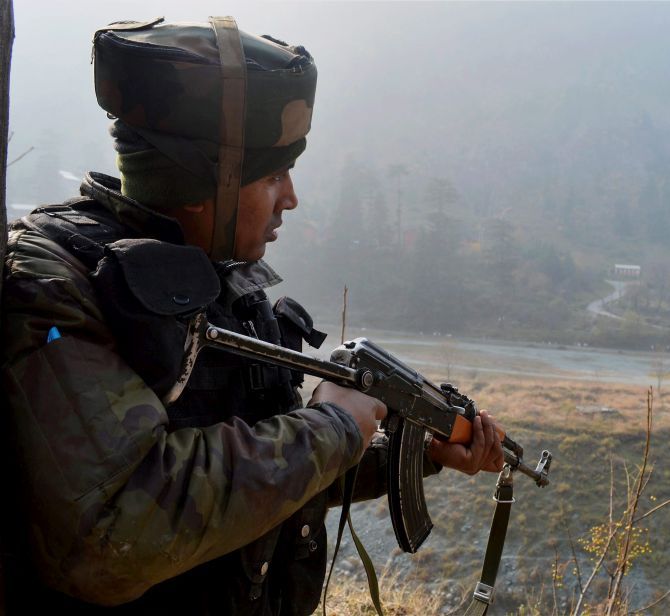'The interesting point about the choice of the area for the surgical strikes is that it is the most sensitive part of the Line of Control,' says Colonel Anil A Athale (retd).

In the wake of the Uri terror attack, India under Narendra Modi has embarked on an escalation of the conflict.
The initial operational facets of this escalation were diplomatic and economic with a military option in the background.
This priority to diplomatic as opposed to military seems to have lulled Pakistan into believing that India would not react militarily.
Then came the surgical strikes against terror launch pads on November 29, mainly in the Rajouri-Poonch sector.
Indian Special Forces, who carried out the attacks, showed extraordinary skill and professionalism and deserve our congratulations for a job well done.
The cross-border strikes, for the first time openly after the 1971 War, sends a powerful signal to the terrorists that they cannot take their sanctuary for granted.
It was a nuanced message in that India did not target the Pakistan military deliberately. This leaves an escape door for the Pakistanis and an incentive for restraint.
The action was thus a well calibrated response. The strategy seems effective as Pakistan has already gone into reactive mode.
The government deserves kudos and support from all citizens.
We must continue to put pressure on Pakistan on the military, political, economic and psychological fronts till it gives tangible evidence of not just some actions, but a change in mindset.
Anti-Indianism is the bedrock of Pakistani nationalism and our long-term strategic goal must be to change that.
Given the nature of the threat and its persistence, India would be well advised to continue to hold the initiative in escalation and maintain relentless pressure on Pakistan.
Dealing with the threat of terrorism from Pakistan that is rooted in its ideology and social conditioning is a long-drawn struggle.
It is more a five-day Test match than a T20 game, to use a cricket metaphor.
All this ought to be self-evident, but it is not in a peculiar Indian context.
James Douglas, a British historian writing in 1893 (Bombay and Western India, Volume II, page 251) accurately described this Indian malaise: 'In India inactivity or temporary retreat in war is never seen as prudence or stratagem. A side that ceases to gain (immediate) success is generally supposed to be on the brink of ruin.'
Anyone even slightly familiar with Indian military history will wholeheartedly agree with this assessment. Indians must be prepared for the long haul.
In the intervening period there will be costs to be paid, but we should not flinch from it for at least our children and grandchildren should be free from this menace.
What is going to be Pakistan's and the world's reactions to the Indian action?
The interesting point about the choice of the area for the surgical strikes is that it is the most sensitive part of the Line of Control.
Pakistan's Kahuta complex, where it manufactures missiles and nuclear weapons, is just 70 km from the LoC at Balnoi.
The eastern edge of the Mangla dam, that supplies 40 per cent of Pakistan's electricity and is the mainstay of its irrigation, is just 12 km from the LoC at Jhangar near Naushera.
The areas adjoining the LoC are thickly populated on the Pakistani side whereas on the Indian side there are no targets of comparable strategic value.
If Pakistan decides to escalate and indulge in shelling and use of artillery, it stands to lose much more than India.
In fact, from the Bhimbergully area, if India is to use its Pinaka rockets, the sound of falling rockets would be heard in the suburbs of Rawalpindi, the location of its all-important army headquarters.
So far in the firing exchange India has not used its rocket artillery, but if push comes to shove we may well do it. Where will that leave Pakistan?
It seems that Pakistan is currently in denial mode. This is nothing new.
In the 1980s, when it suffered reverses On the Siachin Glacier, it kept the news hidden from its people.
During the Kargil conflict in 1999, it lost several soldiers of the Northern Light Infantry, but it refused to even accept the bodies of its fallen soldiers in order to maintain that its army had no role in the adventure.
It is very likely that Pakistan will continue to deny that any cross-border raids took place at all.
Surgical strikes by the United States against terror targets in Pakistan through drones is an old phenomenon.
The world is amused by the Pakistani argument and pretensions of victimhood.
In any case, the only targets for Pakistan on the LoC are army installations.
India can be well be prepared to face any misadventure there.
What is most likely is that Pakistani terrorists will activate sleeper cells in India and hit at soft targets. They have done it on October 29, 2005 when festival shoppers in Delhi were targeted by terrorists, killing over 60 people.
India has to tighten its vigilance in the interior areas.
This is not the end, just the beginning of the end to Pakistan supported terror. We have many miles to go before the region becomes peaceful, to paraphrase Winston Churchill.
Colonel Anil A Athale (retd) is a military historian and co-author of Nuclear Menace: The Satyagraha Approach published in 1997.










